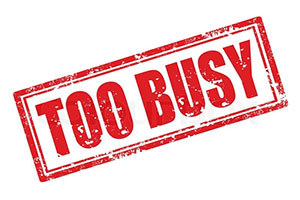 In the endless battle for better work/life balance, we say we want to work smarter, not harder. But do we? We search for life hacks and consume books on how to do more with less. But it seems we like the idea of the 4-hour workweek more than we’re capable of implementing the concepts. Intuitively, this just doesn’t make sense. Why do we complain about the lack of work/life balance, and also constantly brag about how busy we are? There are a number of factors at play here, but one disturbing factor is how much our culture rewards being busy.
In the endless battle for better work/life balance, we say we want to work smarter, not harder. But do we? We search for life hacks and consume books on how to do more with less. But it seems we like the idea of the 4-hour workweek more than we’re capable of implementing the concepts. Intuitively, this just doesn’t make sense. Why do we complain about the lack of work/life balance, and also constantly brag about how busy we are? There are a number of factors at play here, but one disturbing factor is how much our culture rewards being busy.
Without thinking through the difference between being busy vs. being productive, we interpret someone working 20 hours straight as being committed and capable of sacrificing themselves for the organization. While we reward them for going “above and beyond,” we never ask if 20 hours of work was necessary. As a result, what gets rewarded, gets replicated. Busyness becomes the standard. When the boss says, “How’s the week going for you?” You would never respond, “It’s been really slow. I’ve had a lot of time to just think.” Instead, we make sounds of exhaustion before we list off as many possible work activities as we can think of. We boast about business to distract anyone from asking about real results.
The topic of rewarding busyness comes up frequently in tech hot beds like Silicon Valley. While tech companies express a desire for more qualified female candidates, the culture of rewarding busyness doesn’t align well for many females who (like most working moms) still fill traditional gender roles at home. Their male counterparts stay at the office working all evening, while the female workers head home to start round 2 of the day providing dinner, helping with homework, and cleaning. The end result is the males are more visible. They’re seen working through the evening at the office, and wearing the same outfit the next day. They’re congratulated as if they just crossed the finish line in Corporate Iron Man. Meanwhile, the female counterpart who may produce better results and work more efficiently is relatively invisible.
The physical impacts of being busy/overworking are devastating. Higher incidents of blood pressure issues, heart attacks, obesity, anxiety, and depression are common among workaholics and “busy bees.” It’s up to leaders to end the culture of busyness. Leaders must establish clear boundaries and model healthy work-life balance behavior for others.
- Ensure your employees use their PTO and reward productive workers with more time off.
- Set KPI’s around efficiency and results, while ignoring displays of busyness for busyness sake.
- Or address the problem directly by redirecting displays of busyness into a conversation about how to become more efficient.
The next time your team member humbly brags about how many hours they worked consecutively, ask one question—Why?
